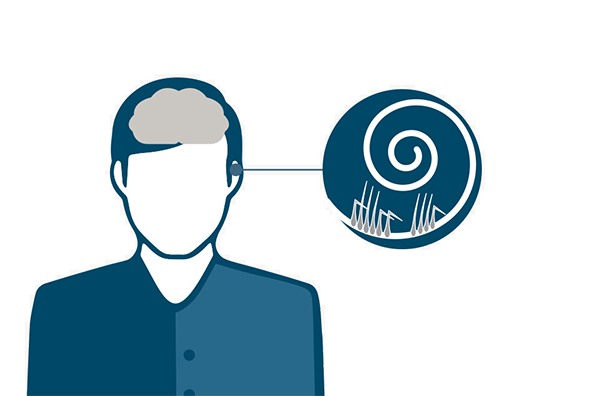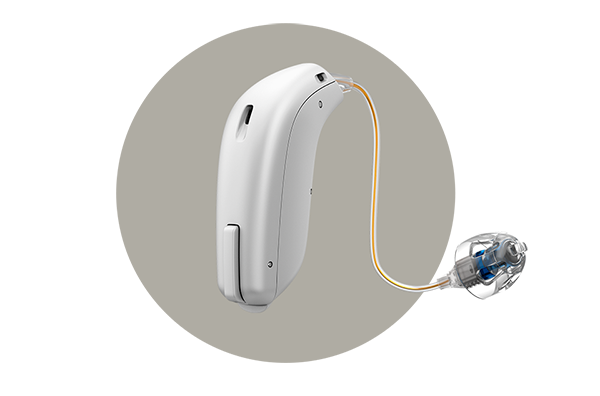Tinnitus Explained
Annoying sound that only you can hear
Tinnitus is surprisingly common – about 10% of people experience it all the time.
Although it can’t be cured, you can take control of it to significantly minimise its impact.

What is Tinnitus?
Tinnitus can be a ringing, buzzing, hissing or roaring sound, and may be temporary or permanent. This noise in your ears or inside your head is unique to you. An estimated 80% of people who suffer from tinnitus also experience some degree of hearing loss, though they may be unaware of it. However, even though tinnitus often goes hand-in-hand with hearing loss, it is not a disease. Tinnitus is a symptom that can be caused by many things, and even begin for no apparent reason. But it can have a major impact, bringing stress, anxiety, anger and sleep loss. The first step towards taking control of your tinnitus is to consult a professional, so that together, you can find the treatment plan that will help you.

The many causes of tinnitus
Tinnitus can originate anywhere between the inner ear and the brain and can be constant or intermittent, temporary or chronic. It is still uncertain exactly how tinnitus begins, but it can result from a variety of causes, just as hearing loss does. However, it can also occur for no apparent reason.
- Exposure to loud sounds
- Natural aging process
- Sudden impact noises
- Injuries to the head and neck
- Reaction to medication
- Emotional distress or distress
Tinnitus and the brain
When we hear, sound waves travel through the ear canal to the middle ear and then onto the brain. Hair cells in the inner ear transform the sound waves into electrical signals, which then travel to the brain. The brain translates these signals into meaningful information — the sound we hear.
So what creates the perception of sound where there is none?
Although the causes appear to vary, experts suspect that in many cases tinnitus results from damage to hair cells in the inner ear. Experts believe that the brain sometimes misinterprets the reduced signals from the ear, resulting in a perception of sound — tinnitus — that isn’t really there. You should always consult a physician or hearing professional if you are experiencing any symptoms of tinnitus.

Can I treat my tinnitus?
There are many ways to take control of your tinnitus and reduce its impact on your life, although your tinnitus may not go away entirely. Everyone has a unique experience of tinnitus, so a hearing care professional can help you manage your particular symptoms using a combination of education, counselling and sound therapy.
Starkey Relax App
Starkey Hearing Technologies have created Relax, an app to help provide personalised relief from tinnitus. Relax allows you to create new, customised relief sounds coupled with soothing images to accommodate the changing behaviour of your tinnitus. By modifying the volume, frequency response and rate of fluctuation, users can create customised versions for each of the 12 relief sounds unique to their own tinnitus.


Sound therapy relieves the symptoms of tinnitus
Listening to sounds can be a helpful tool for managing your tinnitus. Adding pleasant sounds to the sounds you hear already can reduce the impact of tinnitus by helping you move your attention towards the sounds you want to hear, rather than the sound in your head. Compare it to listening to a single violin in a room. Alone, you can only focus on the violin, but if you add a symphony orchestra to the violin, it becomes less distinct and part of the overall sound.
Hearing aids that play relieving sounds
Most hearing aids can help distract you from your tinnitus by playing a wide range of relief sounds like white noise and soothing ocean-like sounds. You can discreetly control the sounds in your hearing aids using Apps. You can adjust the sounds until they give the relief you need — wherever you find yourself needing it.What’s more, you can wirelessly stream alternative tinnitus relief options, such as your favourite music, audio books, podcasts, or even relaxation guides.

Tinnitus Support Group
It is estimated that Tinnitus effects 250 million people worldwide and over 6 million in the UK. According to Tinnitus UK, tinnitus costs the NHS £750 m a year. If you are suffering from tinnitus, you are not alone. All too often people are told there is nothing one can do about the condition but this is not the case.
At Help in Hearing we offer full tinnitus assessments and tinnitus counselling programme. There is a support group in Marlow which was originally set up by Help in Hearing’s Practice Manager, Gilly Wright, and is now run by a fellow member and Tinnitus UK volunteer Chris Zaremba.
Gilly, who has trained as a Tinnitus Advisor, says: “ Support groups can play such a fantastic role as you can feel so isolated. Sometimes even friends and families aren’t able to understand how bad it can be. The ethos of the Marlow group is to be understanding yet positive, giving a sense of belonging and hope by exploring ways of helping with tinnitus.”
Visit our Tinnitus Support Group page to see details of future events.
Spotify tinnitus playlist
There is now a Tinnitus UK Spotify playlist to help relieve tinnitus. Find out about this and a link to listen to the playlist on our blog page.
